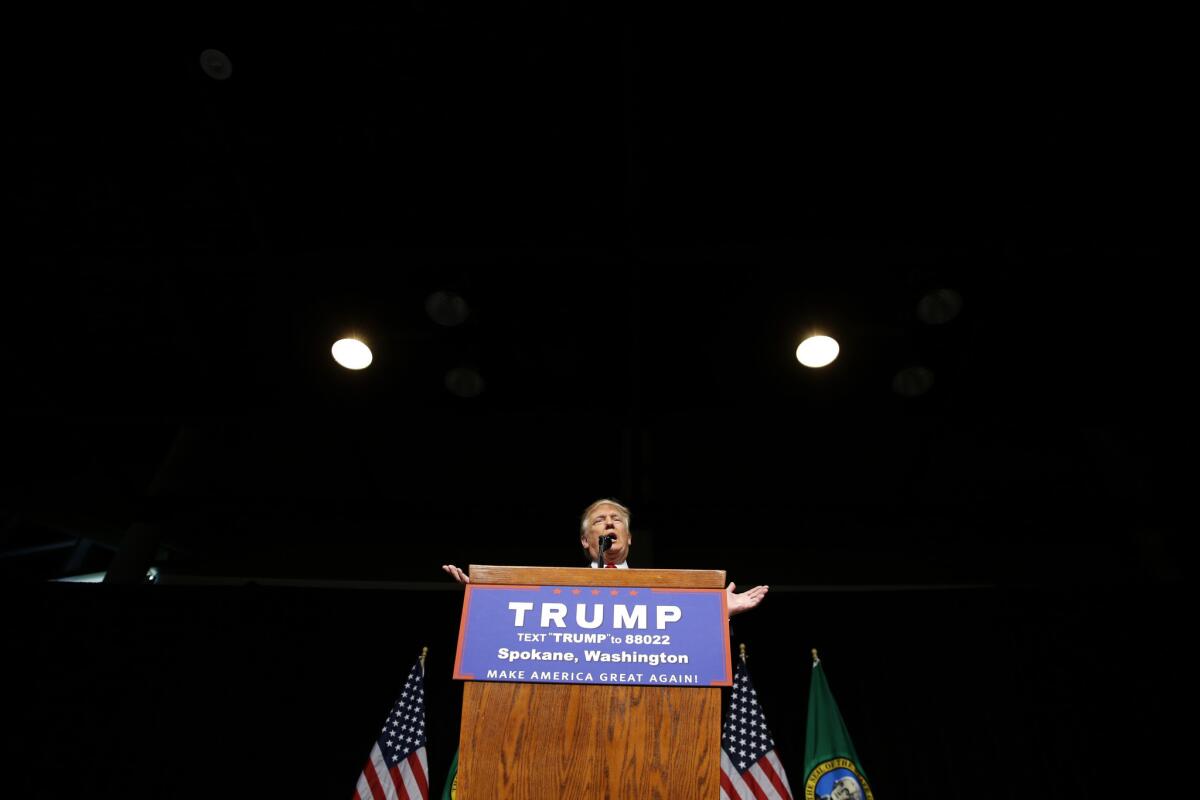Donald Trump’s latest campaign shifts are not likely to be his last

Reporting from Washington — One of the top reasons voters have flocked to Donald Trump’s campaign has been because the tough-talking businessman “tells it like it is,” polls have shown.
But what, exactly, Trump stands for has become a shifting picture of policies and proposals that even he acknowledged Sunday may not produce the promised outcomes.
It’s not just that the billionaire’s ideas are vague by traditional political standards: bring back jobs, build a “beautiful” wall, “make America great again.” The political newcomer does not appear grounded in an ideology beyond assuring that America is “winning.”
On Sunday, Trump, the presumed Republican nominee, offered fresh evidence that he will be no ordinary presidential candidate, dismissing his own tax cut proposal as unlikely to happen.
“Let me explain how the world works, OK?” Trump said on “Meet the Press.”
Trump went on to describe his tax plan, which hews to traditional Republican ideas of lowering individual and corporate rates, as a “floor” — a starting point for eventual negotiations with Congress.
“I don’t think that’s going to be the final plan,” he said. “I put it in. But that doesn’t mean that’s what we’re going to get. We have to negotiate.”
The more likely outcome? Higher tax rates for businesses and the wealthy than he initially proposed, he said.
“It’s called life,” he said. “It’s not my word, of course.”
The ease with which Trump strays from Republican Party orthodoxy and shifts shape on core campaign tenets is part of what has flummoxed many members of the GOP establishment and fueled resistance to his candidacy.
Campaigns often require awkward pivots, of course, as candidates work to broaden their appeal beyond the party faithful to a general election audience. But promises are not typically changed without at least the appearance of hand-wringing and poll-tested explanatory notes.
One of the leaders of the GOP resistance, House Speaker Paul D. Ryan (R-Wis.), will meet with Trump and other GOP leaders this week on Capitol Hill, but their ideological differences are so vast that many insiders doubt there will be a meeting of the minds.
“I don’t see what Donald Trump can do to earn his support,” said one Republican operative, granted anonymity to frankly discuss the situation.
On trade, entitlement reform and foreign policy, there is a wide gulf. Neither Ryan, the GOP’s chief policy architect, nor Trump, appears willing to budge.
“Let’s make something very clear: Donald Trump just won a Republican primary,” top Trump advisor Paul Manafort said Sunday on Fox News. “So, it’s his agenda that has just been cemented as what the American people, or at least Republicans and independents who voted for him, want.”
So far, Trump’s changing views — he supported abortion rights before he didn’t; he opposed hiking the minimum wage before he bemoaned the hardship of living on $7.25 an hour — have done little to cool voter passions for his candidacy.
It’s all part of his outsider status — what he portrays as a willingness to talk frankly about the challenges the country faces and the potential solutions.
That support could be tested, however, on the next big shift, as Trump allies begin raising millions of dollars to back his candidacy.
A pro-Trump super PAC is gearing up to raise the extraordinary sums that will be spent, a projected $1 billion by each side, on the campaign showdown this fall.
Great America PAC, which counts a California GOP operative, Eric Beach, as a top strategist, expects to become the main vehicle for millions of dollars from wealthy donors of the sort that have funded presidential elections in the past.
“Usually, a super PAC is the frosting on the cake. My sense is we’re going to be part of the cake,” veteran GOP strategist Ed Rollins, who joined Great America as an advisor, said during a recent conference call with supporters.
“He’s going to need help,” Rollins said of Trump.
Trump tapped another Californian, Steven Mnuchin, a former Goldman Sachs executive turned film producer whose credits include “Entourage,” “American Sniper” and “The Lego Movie,” as his finance chairman, tasked with reeling in donors.
In interviews during the primary season, voters in many states cited Trump’s independence from big-dollar donors as a key reason for their support. Many voters believe campaign money has a corrupting influence on politicians.
Voters appreciated that Trump is wealthy enough to fund his own campaign, even though private donations have back-filled some of his expenses.
But exactly how wealthy Trump is has long been a matter of debate. And if he is able to fund a $1-billion general election campaign, he does not appear willing to dig that deeply into his own pocket.
“Do I want to sell a couple buildings and self-fund?” Trump said on MSNBC’s “Morning Joe.” “I don’t know that I want to do that necessarily.”
Trump has downplayed the change of position, saying the fundraising is simply part of his new duties as the party leader who must help Republicans on the ticket this fall.
“I really won’t be asking for myself. I’ll be asking money for the party,” he said, “and really it’s something that we’re going to start on right away.”
The PAC is now holding weekly calls with supporters.
ALSO
Can Donald Trump redraw the political map? He must to win the White House
Thanks a lot, Indiana: Here’s what California Republicans could have had
California nurses union is all in for Sanders. But can it tilt the outcome on its home turf?
Follow on Twitter @LisaMascaro
More to Read
Get the L.A. Times Politics newsletter
Deeply reported insights into legislation, politics and policy from Sacramento, Washington and beyond. In your inbox three times per week.
You may occasionally receive promotional content from the Los Angeles Times.











